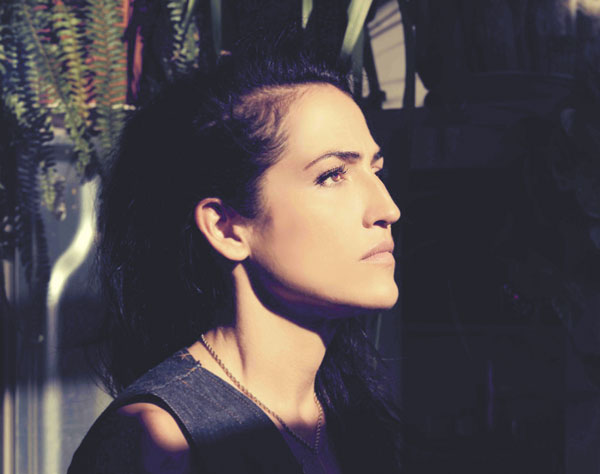
Joan As Police Woman, AKA Joan Wasser, has just released her fourth album, The Classic. AUGUSTUS WELBY reports.
‘I’ve been on the ride before, it never stops at all’, sung Joan Wasser on her 2006 debut LP, Real Life. The ride continues eight years later with the release of her fourth album, The Classic, and without making a drastic stylistic departure, Wasser has updated her sonic template – just as she’s done for each Joan As Police Woman record.
Gleefully grabbing from Motown and ‘70s soul music, it’s the New York-based songwriter’s most buoyant set of songs thus far.
“That’s just something that has been a constant in my life; if something’s done, move on to the next thing,” she says. “There’s always stuff to do, more music to be created, more people to collaborate with. Once it’s done, ‘Bye – see you later’. I think certain ex-boyfriends of mine are rather horrified at that.”
First single, Holy City, perfectly exemplifies the record’s more extroverted nature. It’s an uplifting Motown number that lyrically celebrates an exquisite romance and gains additional firepower from comedian/musician Reggie Watts’ scat-singing outro. Watts features again on the doo-wop title-track, while elsewhere The Classic showcases instrumental improvisation and horns-a-plenty. Wasser has no trouble introducing new facets of her personality on each release, but it’s not a closely controlled progression.
“I’d love to say that I had a grand plan, but guess what? That wouldn’t be true,” she explains. “I just keep going and I write. Clearly certain influences or feelings are revealed on each record, because of the place I’m in – that’s for sure – but I don’t plot it out. I do it and then I survey the scene after I do it and try to make sense of it. Or not even make sense of it – just do it.”
There are some sustaining characteristics that unite all four Joan As Police Woman records: her celestial vocal style, lyrics that jump from sassy to sincere and an authentic invocation of soul music. Yet, Wasser isn’t inclined to rehash a formula that previously served her well.
“When I made Real Life I was very obsessed with remaking I’m Still In Love With You by Al Green. I wanted the songs to be very concise and simple and clean. That record sounds quite polished and I really like that sound, but I did it already.”
So if Real Life was an attempt to remake an Al Green record, what was Wasser’s guiding example when crafting The Classic? “When I’m in a period of writing for a record, I don’t listen to any music,” she reveals. “I listen to music when I’m travelling or when I’m in a car but I don’t listen to all that much music when I’m home. I love silence. People are like, ‘okay, weirdo’, but that is the truth. Soul music and Motown, that’s the music that’s been near and dear to my heart, so I think that just came out naturally on some of these songs.”
Despite not being a massive listener, Wasser is perpetually writing music and clearly she takes songwriting quite seriously. However, she concedes that what becomes of her songs after they’re released is out of her control. “I’ve got to just do the best I can and then once I’m done it’s not really mine anymore, it’s the public’s. Then I just sort of move on and start working on something else. If I thought about how much stuff was out there I might lose my mind. And I don’t want to do that, I don’t want to lose my mind.”
The fact that Wasser doesn’t exercise precious ownership over her songs means she’s also willing to utilise audience reactions to help make sense of new songs. “For this record I played a monthly solo show to work out new material. Those are massively informative because the song can really sound one way in my apartment alone and sound very different in front of actual breathing human beings.”
This public evaluation method hasn’t pushed her to conform to a safe or obviously accessible format. In fact, The Classic features the longest compositions in Wasser’s catalogue. For example, the record’s fourth track, Good Together, is a darkened seven-minute journey through emotions and textures that culminates in a guitar-screeching jam.
“In the past, when the lyrical content was done, shortly after I would fade it out,” Wasser says. “This time I was like, ‘I would want to hear that myself, the band keep playing, so why am I not giving my listeners credit enough to want to hear that stuff?’ It did feel like a chance I was taking, to allow the songs to really go, travel and not stop for a while. People have given me really good feedback about that, so I feel glad that I took that chance.”
Speaking of taking chances, naming an album The Classic is a rather bold move. The term alludes to high-brow ideals, time-acknowledged quality and an artist’s crowning achievement. So how should it be interpreted in regards to Wasser’s new record?
“I just think that it’s funny. I know that some people do – probably some people don’t, but that’s okay. There’s a song on the record called The Classic and it’s about an ultimate lover. I say, ‘You’re the archetype, you’re the classic’, it’s very bombastic and grandiose and kind of over the top. And I feel like there’s elements of that on this record.”